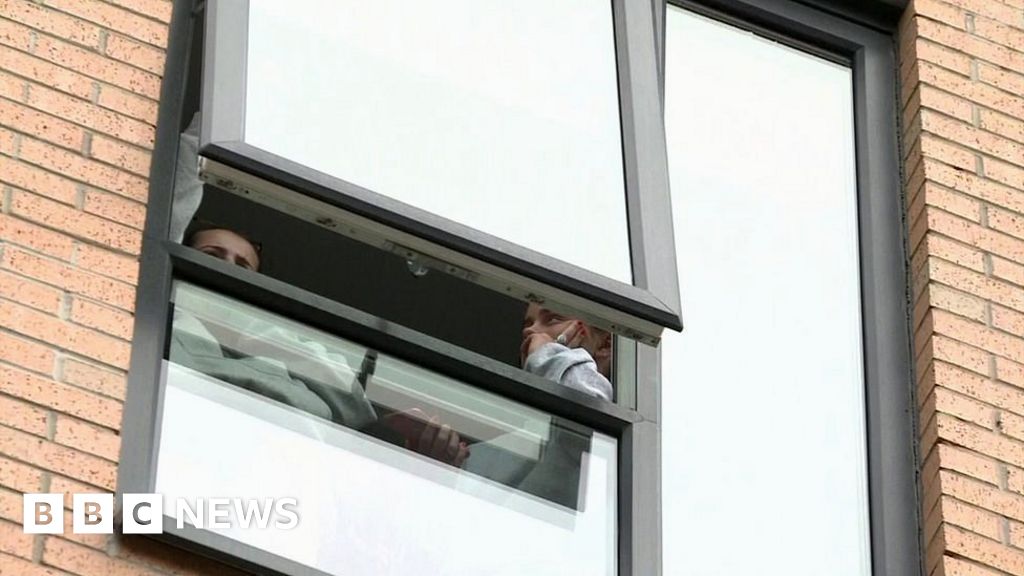 Image copyright
Getty Images
Image copyright
Getty Images
A-level and GCSE students in England are being promised their final results will be no lower than their mock exams.
The Department for Education announced a "triple lock" - so results will be the highest out of their estimated grades, their mocks and an optional written exam in the autumn.
It follows Scotland's decision to switch to teachers' predicted grades.
The National Union of Students said using mock results risked "making a mockery" of the exam system.
Head teachers attacked the last-minute change, which will also apply in Northern Ireland, as "panicked and chaotic".
'Total botch job': Why are heads so angry about using mock exams?
The change means that if pupils get an estimated grade lower than their mock exam they can appeal - but this will have to be through their school, with the terms for approving appeals still to be decided by the exam watchdog, Ofqual.
Image copyright PA MediaBut Geoff Barton, leader of the ASCL head teachers' union, said the move "beggars belief" because mock exams are carried out in many different ways and are not consistent enough to be used for A-level and GCSE results.
"The government doesn't appear to understand how mock exams work. They aren't a set of exams which all conform to the same standards. The clue is in the name 'mock'," said Mr Barton.
East Sussex head teacher Jules White described the decision as a "shambles" - and a "total botch job".
He said in some schools pupils might know in advance the specific topics on which they are going to be tested - and in other schools they might not have taken mocks before the lockdown.
Other schools might be tough on marking mocks as a way of getting pupils to revise.
To use such different circumstances for results "defies logic and credibility," said Mr White.
"The use of mock exams results risks making a mockery of the whole system," said Larissa Kennedy, president of the National Union of Students.
She warned there was a "lack of a standard approach to mock exams" and "they are not taken by all candidates".
How grades are being decided around the UK
England and Northern Ireland: the key information for A-levels and GCSEs will be how pupils are ranked by their school and results in their schools and colleges in previous years. Plus a "triple lock" with the highest grade out of the estimated grade, an autumn written exam or a mock exam, dependent on a successful appeal through a school Vocational qualifications will have estimated results for some courses, but not the same "triple lock" Scotland has switched to using teachers' predicted grades Wales is using AS-levels as an important part of calculating A-level grades Image copyright Getty ImagesThe move in England comes after 76,000 pupils in Scotland had their results upgraded after being lowered by a moderating system which critics claimed was a "postcode lottery" as it linked pupils' results with their schools' past performances.
It drew accusations that high-achieving pupils in low-performing schools would lose out - and that this would particularly discriminate against young people in deprived areas.
The Scottish government has apologised and results will now be based on teachers' predicted grades.
Image copyright PA Media Image caption Protests have changed exam grades in Scotland - now students want the same for the rest of the UKEngland's schools minister Nick Gibb told BBC Breakfast being able to appeal on the basis of their mock results was "an extra safety net for a small group of pupils".
He rejected concerns about confusion and said he would "apologise to nobody for finding solutions - even at the eleventh hour "to stop students being disadvantaged.
It will mean that mock exams will now have an impact on A-level and GCSE results in England and Northern Ireland, alongside how pupils are ranked on ability and the share of grades that their schools and colleges have achieved in recent years.
England's exam regulator Ofqual said relying on teachers' predictions would have unfairly inflated results.
Using teachers' predictions would have meant about 38% of entries would have been A* or A grades this year - considerably higher than the previous record of 27%.
Image caption Vocational qualifications will have some estimated grades issued - but not the "triple lock" appeal systemFor vocational qualifications, such as BTECs, estimated grades are also being issued - but not for subjects which depend on tests for practical skills, which need to be carried out in person.
The "triple lock" approach, linked to mocks and exams in the autumn, will not apply in the same way to vocational qualifications.
The Welsh government has told A-level students that their approach to results is "fair", with nearly half of pupils' final mark based on AS-levels completed last year.
Mary Bousted of the National Education Union warned students in different parts of the UK were now applying for the same university places with results based on "completely different criteria and wildly different pass rates".
What does it mean for university places?
With A-level results only a day away, Universities UK wants "urgent clarification" about what these changes will mean for deciding on places.
Image copyright PA Media Image caption A-level results are going to be estimated this year after exams were cancelledUniversities have been told if students miss out on grades, but their schools are appealing, places have to be kept open until that appeal has been decided.
But the universities organisation says it is far from clear how this will work for appeals over mock exams - and is asking whether results based on mocks can be considered as having "equal status" in deciding who gets accepted or rejected.
They also warn about the practical complications, such as trying to allocate accommodation.
"Never in recent memory have we been faced with such uncertainty and challenge on the eve of A-level and BTec results day," said Anja Hazebroek from the University of Hull.
Image copyright PABut it is still expected to be a good year for students looking for university places - with an anticipated fall in overseas students leaving many places to be filled.
"Those near-miss candidates, if they've dropped one or two grades, universities are being super-flexible about that," said Clare Marchant of the Ucas admissions service..
Are you expecting to receive your exam results on Thursday? How would the government's plan affect you? Email haveyoursay@bbc.co.uk.
Please include a contact number if you are willing to speak to a BBC journalist. You can also contact us in the following ways:

 5 years ago
969
5 years ago
969 
